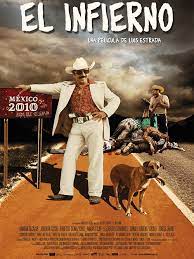
EL INFIERNO
Mexico, 2010, 149 minutes, Colour.
Damian Alcazar, Joaquin Cosio, Ernesto Gomez, Maria Rojo, Elizabeth Cervantes.
Directed by Luis Estrada.
This film, multi-award-winning, was released for the 200th anniversary of Mexican independence. While there is much to celebrate, the stance of the film is that, while there might be national independence, there is huge dependence in the country on the cartels, drug running and deals, the employment of thugs, political and police corruption.
While, basically, there is a straightforward plot, the tone in the screenplay is often satiric and humorous.
The central character is Benny, who went to the United States to make his fortune, has not communicated with his family, returns after 20 years, finds that his brother was caught up in the cartels. As he investigates further, he comes across his brother’s wife and son, gradually gets caught up in the world of the cartels, becomes a thug himself.
The supporting characters are all involved in the cartels, drugs and corruption, a rivalry between cartel bosses and their families, a range of murders and betrayals, the centre is Benny’s nephew, emulating his father, but endangering his mother and Benny. Benny has to make a stance, especially when his friend, one of the henchman of the bosses with great bravado, is also killed.
There are some climaxes at the celebrations of the 200th anniversary, fireworks – and violent fireworks and some apocalyptic resolutions of the plot.
- The title? As described by the characters? The town and the drug situation as hell on earth? No need for the afterlife?
- The 2010 setting, the bicentenary of Mexican independence? The celebrations? The state of Mexico at the time? Drug dealing and the cartels? The effect on ordinary citizens? The police? Officials? Corruption? The campaign for clean up by the president? 2010 and Mexico’s drug situation in retrospect?
- Benny’s story, his going to the US, leaving his mother and brother, 20 years, his being deported? Not knowing what happened to him in the 20 years? No contact with family? On the bus, being robbed, the police holding up the passengers, losing his money? Going back home, his mother, greeting, attacking him for no contact? News of the death of his brother, his brother’s reputation? Going to see his godfather, the hard times, the repair shop? The mother of his friend and her attack on him because Benny’s brother had killed him?
- His reaction to the situation in Mexico, to the drug situation? His getting a job with his godfather? The information about Lupita? Going to the bar, the encounter with her? Going to the house, meeting his nephew, his nephew and his admiration for his father and his reputation? The nephew and his age, devotion to his mother? Her working as a prostitute in the bar, with clients? Benny and his attraction towards her, the beginning of the relationship? His wanting to support her? Her debt to the bar owner?
- Benny meeting his friend Cochi, memories of the past, Cochi and his role, the dealings, his associates? The invitation for Benny to join him? Benny’s reluctance, the example to his nephew?
- The drug situation in the town, the domination of the chief, his hard wife, his son and his rebuking him, yet encouraging him? The deals, the vengeance, the executions, the brutality? The police in his pocket, the town official? His clash with his brother and family? The rivalry, clashes, ambushes and killings? Vengeance? Leading up to the killing of the son? The blame on Cochi, the execution of his eldest boy? Cochi and his death?
- The Mexican Catholic context, images, signs of the cross, blessings? The presence of the priest, funerals, blessings, pocketing the money? At the final funerals and again the money? The bicentenary celebration, the Bishop present, endorsing the drug lord? Benny and his machine gun, shooting everyone, including the Bishop? A nominal Catholicism?
- Benny, the need to pay debts, getting the extra money, with Cochi, becoming part of the gang, the ambush, his having to execute the desperate man, the man putting the gun, Benny killing him? Yet later his reluctance to actually shoot and kill? But the further involvement, the missions of vengeance, the Sergeant and his tough attitude, immediate killings?
- An extravaganza of vengeance, the number of people killed? The consequences of the murder of the air? The drug lord and the alienation from his brother, the setup to kill his brother’s sons, their heads delivered, machine-gunning down the brother?
- The federal official, the interviews, the cards, the promise of witness protection? Benny, in fear for his nephew, finding him, in league with the opposition, his betraying the group, wanting to kill his father’s murderers? Benny, getting on the bus, sending him to Arizona? Benny going to see the official, the information, the filming, the betrayal, torture?
- Benny, taking the police escort to the grave, the money and the drugs? His being shot, in the grave, surviving? Discovering Lupita dead? His vengeance?
- The portrait of the drug lord, local, self-important, no scruple, urged on by his Lady Macbeth -like wife?
- The bicentenary celebrations, all the officials understand, the flags, the national anthem, Benny making his way through the crowd, machine-gunning everyone? The fireworks? The signs and the collapse of the board?
- The nephew, driving from Arizona, the grave for his father, his mother, for Benny?
- And the irony of the final sequence, the nephew and the drug dealers, the killings? His future?
- Serious themes – but the ironic, even comic aspects of the treatment?